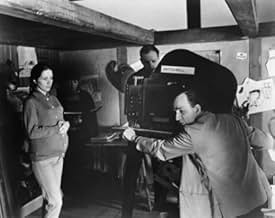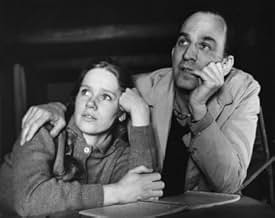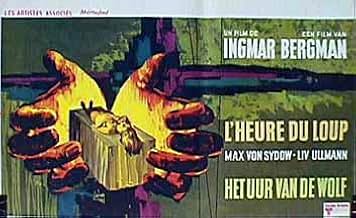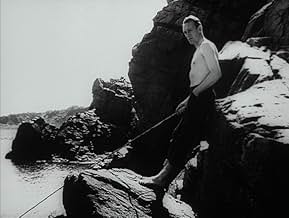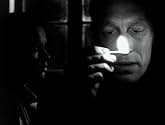VALUTAZIONE IMDb
7,5/10
23.847
LA TUA VALUTAZIONE
Durante una vacanza su una remota isola scandinava con la sua giovane moglie incinta, un artista ha un crollo emotivo mentre affronta i suoi desideri repressi.Durante una vacanza su una remota isola scandinava con la sua giovane moglie incinta, un artista ha un crollo emotivo mentre affronta i suoi desideri repressi.Durante una vacanza su una remota isola scandinava con la sua giovane moglie incinta, un artista ha un crollo emotivo mentre affronta i suoi desideri repressi.
- Regia
- Sceneggiatura
- Star
- Premi
- 2 vittorie totali
Agda Helin
- von Merken's Maid
- (non citato nei titoli originali)
Lenn Hjortzberg
- Kreisler
- (non citato nei titoli originali)
Mikael Rundquist
- Boy in Dream
- (non citato nei titoli originali)
Folke Sundquist
- Tamino
- (non citato nei titoli originali)
Recensioni in evidenza
10neil-313
This seems to be one that divides fans of the master, but I loved it. It's easy to see why people see this as being a bit of an odd-one-out in Bergman's output: it's very direct in it's depiction of disturbed states of mind, directly illustrating hallucinatory states rather than just hinting at them. Others have pointed to references to other films of the horror genre, which seem undeniable.
Not that you'd mistake this for a film by anyone but Bergman. It's rich in connections with other of his films and autobiographical references (such as the terrifying description of being locked in a cupboard as a child). It can be reasonably thought of as Bergman's 'horror film' but he takes on the genre very much on his own terms.
It's a film that lingers long in the mind, with many unforgettable scenes (including the amazing Magic Flute scene) aided by Sven Nykvist's wonderful chiaroscuro photography. The use of music is (as ever with Bergman, the most musical of directors) extremely intelligent: the scene with the boy is set apart from the rest as much by the music as the photography.
Given the quality of the cast, you'd expect superb performances. As ever, von Sydow and Ullmann are excellent, with equally good supporting performances.
At times I was reminded of Rilke's only novel, The Notebook of Malte Laurids Brigge. If you don't know this, I urge you to seek out a copy: there's a distinctly Bergmanesque atmosphere to the whole work, but there are specific images that seem to link to this film.
This is a film that repays repeated viewings. Despite it's extremely disturbing subject matter, to me it's not as emotionally draining as many of Bergman's other films (such as Shame or Winter Light), in spite of (or perhaps because of) the visual horrors on display. Still, I recommend it very highly.
Not that you'd mistake this for a film by anyone but Bergman. It's rich in connections with other of his films and autobiographical references (such as the terrifying description of being locked in a cupboard as a child). It can be reasonably thought of as Bergman's 'horror film' but he takes on the genre very much on his own terms.
It's a film that lingers long in the mind, with many unforgettable scenes (including the amazing Magic Flute scene) aided by Sven Nykvist's wonderful chiaroscuro photography. The use of music is (as ever with Bergman, the most musical of directors) extremely intelligent: the scene with the boy is set apart from the rest as much by the music as the photography.
Given the quality of the cast, you'd expect superb performances. As ever, von Sydow and Ullmann are excellent, with equally good supporting performances.
At times I was reminded of Rilke's only novel, The Notebook of Malte Laurids Brigge. If you don't know this, I urge you to seek out a copy: there's a distinctly Bergmanesque atmosphere to the whole work, but there are specific images that seem to link to this film.
This is a film that repays repeated viewings. Despite it's extremely disturbing subject matter, to me it's not as emotionally draining as many of Bergman's other films (such as Shame or Winter Light), in spite of (or perhaps because of) the visual horrors on display. Still, I recommend it very highly.
It's not that scary or disturbing. From some of the comments here on IMDb I was expecting quite a tough film to sit through. It isn't exactly cheery, but I did crack the occasional smile at Bergman's homage to various Horror films. It is as beautifully lit and framed as Persona, and if you like Liv Ullman, and/or Max Von Sydow, you'll want to see this for their very good performances. It is sometimes "Lynch" like, sometimes "Fellini" like, but not nearly as disturbing as say Mulholland Drive. See it if you're a Bergman fan, or if you like movies with a surreal sense. I bought the DVD on Bergman's reputation (I've seen about 25 of his pictures, and loved, around 20 of them). I was not disappointed in the least.
The painter Johan Borg (Max von Sydow) and his wife Alma Borg (Liv Ullmann) have been married for seven years and are living in an island. Johan is haunted by nightmares of his past. Through his notes in his diary, his wife realizes his madness process. In the end, after living with him for such a long period, she questions her sanity and what is real.
This impressive and disturbing movie about the lost of sanity by a tormented artist is another magnificent work of Ingmar Bergman, again with his favorite actor (Max von Sydow) and actress (Liv Ullmann). A very Gothic and dark horror movie, it is a frightening view of the mind of a mad person. My vote is eight.
Title (Brazil): 'A Hora do Lobo' ('The Hour of the Wolf')
This impressive and disturbing movie about the lost of sanity by a tormented artist is another magnificent work of Ingmar Bergman, again with his favorite actor (Max von Sydow) and actress (Liv Ullmann). A very Gothic and dark horror movie, it is a frightening view of the mind of a mad person. My vote is eight.
Title (Brazil): 'A Hora do Lobo' ('The Hour of the Wolf')
a man moves to a remote island with his wife. he cannot sleep at night and is tormented by inner demons. the film tracks this madness of his. excellent performances by max snydow and liv ullman. the cinematography is beautiful and precise. as is usual with bergman's films, it is not clear on first viewing what the movie is all about. why the man is tormented, is a mystery, at least to me.
Johan can't escape from traumas past, he's tormented, harrowed, provoked and harassed, his mind is playing tricks, it tortures, taunts, afflicts, leaves him confused, muddled, perplexed and aghast.
A surreal overflowing meltdown, full of symbolism, abstraction and confusion, as the artist Johan Borg struggles to cope with the visions and apparitions that haunt his disturbed being. Max von Sydow and Liv Ullman once again present us with characters from the imagination of Ingmar Bergman that exist in an alien world, or at least one most of us are quite unfamiliar with (thank goodness), in a piece of cinema, like so many others from the director, that need revisiting whenever you get the chance, if for no other reason than to see what you missed previously.
A surreal overflowing meltdown, full of symbolism, abstraction and confusion, as the artist Johan Borg struggles to cope with the visions and apparitions that haunt his disturbed being. Max von Sydow and Liv Ullman once again present us with characters from the imagination of Ingmar Bergman that exist in an alien world, or at least one most of us are quite unfamiliar with (thank goodness), in a piece of cinema, like so many others from the director, that need revisiting whenever you get the chance, if for no other reason than to see what you missed previously.
Lo sapevi?
- QuizBergman defines "The Hour of the Wolf" as "The time between midnight and dawn when most people die, when sleep is deepest, when nightmares are most palatable. It is the hour when the sleepless are pursued by their sharpest anxieties, when ghosts and demons hold sway. The hour of the wolf is also the hour when most children are born." According to "Films in Review" critic Henry Hart in the U.S. it's about 4 a.m. when the body's resistance is least.
- Versioni alternativeThere exists an earlier version of the film with an additional, meta-cinematic framing device. In the prologue (lasting about 7 minutes), Bergman is seen on the set directing his actors. The epilogue (lasting about 1 minute) shows us the set being torn down and the crew leaving. These sequences are the only differences to the commonly seen version. Bergman has stated in an interview that he cut off these sequences himself before the general release of the film, as he came to the conclusion that they were just "self-deception". Despite this, a Swedish 35 mm print of the original, longer version does exist, although it's not available on home video in any format.
- ConnessioniEdited into 365 days, also known as a Year (2019)
I più visti
Accedi per valutare e creare un elenco di titoli salvati per ottenere consigli personalizzati
- How long is Hour of the Wolf?Powered by Alexa
Dettagli
- Tempo di esecuzione1 ora 28 minuti
- Colore
- Mix di suoni
- Proporzioni
- 1.37 : 1
Contribuisci a questa pagina
Suggerisci una modifica o aggiungi i contenuti mancanti

Divario superiore
By what name was L'ora del lupo (1968) officially released in India in English?
Rispondi

